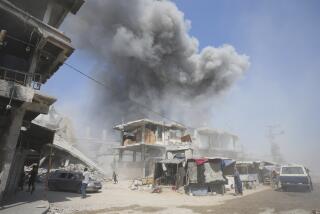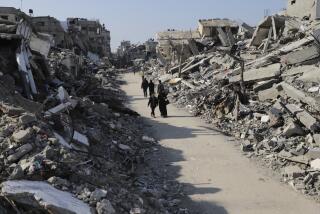U.N. Steps Up Patrols to Stem Attacks on Serb Refugees in Croatia : Balkans: Croatian police allow mobs to descend on convoys headed for Serbia. Deaths, injuries reported.
- Share via
ZAGREB, Croatia — The United Nations moved Thursday to strengthen its presence along a 160-mile route through Croatia to thwart brutal attacks by vengeful Croats against Serb refugees fleeing the country.
At least two people have been killed and hundreds of others--including a carload of Serbian Orthodox nuns--injured since Wednesday, when the Croatian army began evacuating thousands of Croatian Serbs trapped by fighting near the town of Topusko, according to U.N. and witness accounts.
“It is easier to count those not wounded,” said Dusanka Ugljevicanin, a doctor at the Serbian-Croatian border.
She said the two dead were elderly women, one of whom was struck in the head with a brick. Refugees spoke of more fatalities, and the doctor said coffins were being transported to the border.
U.N. spokesman Chris Gunness said at least 70 vehicles carrying 200 refugees were attacked by gangs of Croats, mostly in the town of Sisak about 25 miles southeast of Zagreb, the Croatian capital. Some of the injured had been flogged with flagpoles bearing the Croatian standard, one U.N. source said.
Many Croats who fled fighting in 1991 settled in Sisak after nationalist Serbs forced them from their homes in the breakaway region of Krajina. The Croatian army recaptured the Krajina this week, setting off the frantic exodus of defeated Serbs. “People were quite badly beaten up,” Gunness said. “They were dragged out of cars by angry mobs and thrashed.”
Bands of injured refugees arriving Thursday in Serbia, many wearing rags as bandages, said Croatian police did nothing to stop the assaults. Scores of vehicles chugging across the border had shattered windows, and motorists produced the rocks and bricks hurled at them.
Some refugees said they abandoned their vehicles mid-route to escape swarming mobs, running for safety to buses and trucks. One fleeing man watched from the rearview mirror of a bus as his car was destroyed by the throng, he said.
*
“Everybody was throwing things at us--men, grandmothers, children who could barely walk,” said Dejan Djuric, 18, at the Serbian border. His bloodied head was wrapped in rags.
Croatian police, charged with protecting the convoy, intervened on behalf of refugees only when U.N. civilian police arrived on the scene, said U.N. military spokeswoman Maj. Rita LePage. The local police let the pummeling resume as soon as the U.N. monitors passed, she said.
Residents of Sisak reported to the United Nations that they were ordered to turn off lights around their homes after nightfall so beatings could be more easily concealed. The worst incidents occurred in Sisak, but there were problems along a 35-mile stretch of country roads leading to the main highway to Belgrade, the Serbian and Yugoslav capital.
Once on the highway, refugees said, the attacks stopped and Croatian relief workers offered food and drink at a rest stop.
About 100 U.N. police normally deployed in central Croatia were sent to bolster the 50 U.N. police officers already assigned to the refugee route, the United Nations said.
“Our No. 1 priority is to get more United Nations personnel into a monitoring capacity so this does not happen again,” LePage said.
The United Nations’ policing role, until recently a small component of its mission in Croatia but now stepped up, may soon become its primary focus. Yasushi Akashi, the U.N. special envoy in the Balkans, said Thursday that the United Nations will withdraw most of its 12,400 peacekeepers in Croatia within a few months.
U.N. peacekeepers arrived in 1992 to oversee a cease-fire brokered between the breakaway Krajina Serbs and the Croatian government. With this week’s defeat of the Serbs, most peacekeeping duties have been rendered redundant.
Akashi said the United Nations expects to maintain “a reduced but effective presence” in Croatia. An undetermined number of peacekeepers will probably remain in eastern Croatia near the Serbian border, the only remaining pocket of Serb-controlled territory in Croatia. There are also likely to be military observers, civilian police and human rights monitors.
Details of the scaled-back mission are being negotiated with the Croatian government and are expected to be presented to the U.N. Security Council within a few days, a U.N. source said.
*
Meanwhile, in Moscow, Russian President Boris N. Yeltsin, warning that the Balkans is on “the brink of a major war,” again invited the leaders of the warring nations--this time including Bosnia-Herzegovina--to Moscow for a peace summit.
He hinted strongly that Russia might break international sanctions against Serbia if peace efforts fail.
Yeltsin announced the initiative after a two-hour meeting in the Kremlin with Serbian President Slobodan Milosevic. It was unclear whether the Bosnian and Croatian leadership will accept Yeltsin’s bid.
The Clinton Administration will include Moscow on the itinerary of a U.S. delegation headed by National Security Adviser Anthony Lake and Undersecretary of State Peter Tarnoff that is seeking to win support for a peace plan establishing ethnic zones in Bosnia. The decision was made after a telephone conversation Thursday between Secretary of State Warren Christopher and Russian Foreign Minister Andrei V. Kozyrev.
Yeltsin returned to work Monday after a month of medical treatment determined to play a bigger role in the Balkans. Russia has never had a clear policy in the conflict, but Foreign Ministry spokesman Mikhail Demurin said Yeltsin wants to avert a “humanitarian catastrophe” in the wake of Croatia’s recent military offensive in the Krajina.
Murphy reported from Zagreb and Wilkinson from the border of Croatia and the rump Yugoslavia. Times staff writer Richard Boudreaux in Moscow also contributed to this report.
More to Read
Sign up for Essential California
The most important California stories and recommendations in your inbox every morning.
You may occasionally receive promotional content from the Los Angeles Times.














